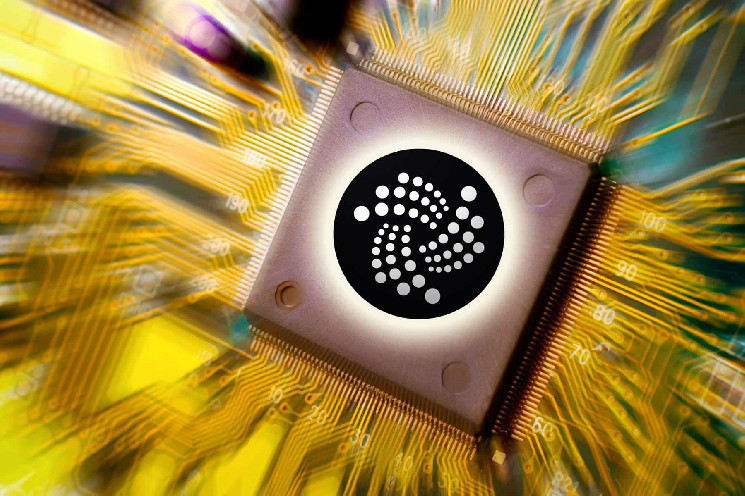- IOTA’s infrastructure ensures robust data security through advanced cryptography and offers high network scalability to handle numerous participants and transactions, which is essential for businesses.
- IOTA is driving the transformation of the global digital economy by providing a scalable, decentralized infrastructure based on the IOTA Tangle.
The global digital economy of the near future presents both exciting opportunities and significant challenges. As technological revolutions reshape the landscape, new business models and job creation avenues are emerging.
IOTA is at the forefront of this transformation, providing the technical, decentralized infrastructure necessary for the new economy. Designed to be open, green, and highly scalable, IOTA’s digital infrastructure is built on the IOTA Tangle, a feeless distributed ledger protocol that facilitates seamless data and value transfers.
IOTA’s infrastructure is intended to be the most reliable distributed ledger technology (DLT) for Web3 applications and digital economies. This open-source platform allows businesses to leverage its technology stack to develop tailored solutions across various industries.
The IOTA Tangle supports a range of functionalities and addresses specific industry problems, promoting the development of new verticals that benefit from Web3’s features, per the CNF update. These include decentralization, trustless verifiability, self-governance, new funding opportunities, native built-in payments, and native token interoperability. Let’s take a look at how IOTA can help businesses.
1. Security
In today’s connected economy, ensuring the security of each device is paramount. Businesses that successfully protect data gain the trust of their audiences. IOTA secures data using the Tangle’s state-of-the-art cryptography, ensuring that all transactions are conducted with robust cryptographic encryption.
2. Network Stability
Businesses require networks capable of managing an increasing number of participants and transactions. Bottlenecks hinder operations, and network stability must be maintained across various platforms without a single point of failure. IOTA offers high scalability, with virtually no limit to the number of devices in the network, and can already process over 1,000 transactions per second.
3. Monetization
To effectively monetize their data, businesses need the ability to transact value and data at minimal or no cost, avoiding the high or volatile transaction fees that can undermine business models in the DLT space. Moreover, with IOTA, there are no transaction fees, ensuring that the cost of carrying out a transaction will never exceed the value of the transaction itself.
This paper also outlines how the IOTA Foundation collaborates with organizations of all sizes across various industries to develop innovative solutions and business models. Join us and discover how your business can benefit from IOTA. Recently, IOTA announced $2.75 million in grants to 25 different projects across DeFi, NFTs, and SocialFi, per the CNF update.
4. MicroTransactions
Microtransactions are crucial for the Internet of Things (IoT). Take cars, for example; they gather vast amounts of weather, road, and traffic data. However, current data monetization models make it impractical for cars to sell this data. The third-party facilitating data collection and processing charges a merchant fee, which, if it exceeds the value of the collected data, makes selling it unfeasible. IOTA can also help with enterprise tokenization, per the Crypto News Flash report.
5. Scalability
While centralized IT and payment systems can be cost-efficient, secure, and fast, they lack the primary advantage of distributed ledger technology (DLT): decentralization and trustworthiness across unknown entities. Traditional blockchain, on the other hand, often faces challenges related to cost-efficiency and scalability.
IOTA’s architecture addresses these issues, making it suitable for a wide range of use cases. The IOTA protocol was developed with the highest industry requirements in mind, ensuring it meets diverse needs effectively.
6. Data Integrity
Real-time data integrity at scale, combined with feeless transactions of data and value, makes machine-to-machine communication and data sharing between unknown counterparties feasible. This capability also enables companies to monetize their data by sharing it with others along the supply chain and devising new customer offerings, such as energy microgrids where prosumers trade energy locally.
IOTA allows for secure data transactions without the need to buy or hold cryptocurrency. This sets IOTA apart from other blockchains or DLT protocols and provides a significant economic advantage for companies seeking the benefits of DLT without the concerns associated with cryptocurrency. Instead of a token fee, IOTA may also require a deposit of tokens to secure data on the main ledger. IOTA then fully returns this deposit when the issuer archives the data.
As of press time, IOTA is trading 1.5% down at $0.1526.
